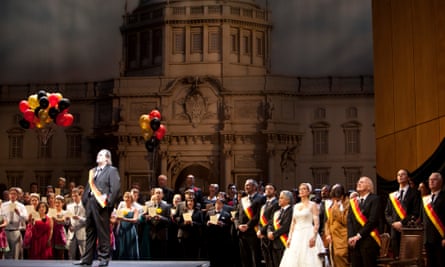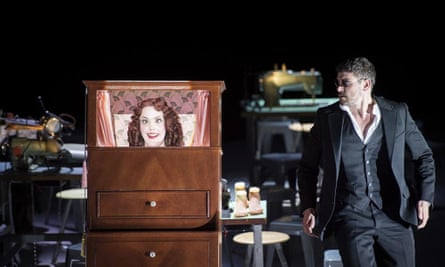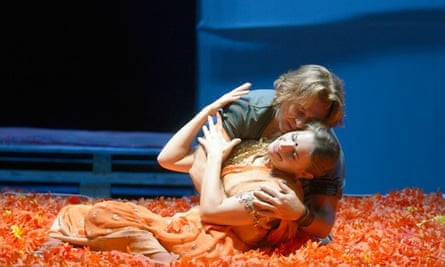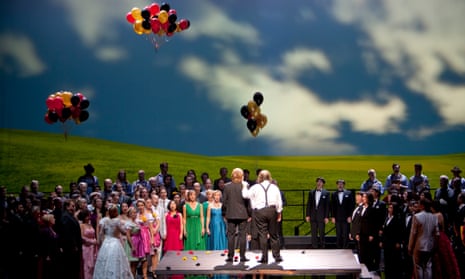Plenty of great cities do not have an opera house at all. Others, from Milan to Manaus, get by very well with just the one. A few have enough money and public support for two; though, as London knows and New York has discovered, that can prove a struggle. Almost alone in the world, Berlin maintains three opera houses, and all three of them remain companies that cut a dash on the international stage.
Berlin’s state opera, the Staatsoper, is the descendant of the 18th century Prussian court opera and has long been one of the premiere houses of the world. The Komische Oper, founded in the 19th century, has always promoted operetta and innovative ideas, with a global artistic influence out of all proportion to its size. Meanwhile the Deutsche Oper, established after 1945 to bring opera to west Berlin – the other two houses were in the communist east – straddles both traditions while aping neither.
In the years after the fall of the Berlin Wall there was regular argument about whether the reunited city needed or could sustain all three. More recently, though, that discussion has gone quiet, and today the three houses appear to be more of a mutually respectful team than a collection of rivals. This weekend, to mark the 25th anniversary of the reunification of Germany following the fall of the Berlin Wall, the city’s three opera houses got together to coordinate the start of their seasons with a trio of premieres that showcased their distinctive but complementary talents.
Pride of place, at least in terms of glitz, still belongs to the Staatsoper. The company is currently in exile in west Berlin’s Schiller theatre while its beautiful traditional home on Unter den Linden is modernised and refurbished. The work is taking much longer than was originally anticipated when it began in 2010 and is not now expected to finish until 2017. Yet standards, especially in Wagner, are undiminished. So, for the anniversary of German unification, the Staatsoper played the most German of operatic cards, in the shape of Wagner’s Die Meistersinger von Nürnberg in a new production by Andrea Moses conducted by its music director Daniel Barenboim.

Barenboim was quoted in a Berlin newspaper interview denying that Meistersinger is a political opera. That was, in the end, also the message of Moses’s sometimes cluttered but ultimately well-judged production. Her contemporary staging, in which the German flag was repeatedly referenced, wrestled continuously with the work’s political and national associations. At the climax of the Act 3 quintet, however, Moses had Wagner’s characters set the flag aside for something more humanistic. That message was carried through into the much-debated closing scene, where the invocations to German art gave way to a more universal – and green – vision.
Musically, this Meistersinger was of the absolutely highest rank. Fluent and supple conducting, with the sparkling playing of the Berlin Staatskapelle in the pit, underlined Barenboim’s status as the finest Wagner conductor of the era. Though the overture surged and sang like a new discovery, it was in the third act that the greatness of his conception came to the fore. The handling of details were masterly, as in the transition from Beckmesser’s visit to Sachs, but it was the overarching pace of the interpretation that was most compelling. The final scene, which can so often seem to require a large collective deep breath after the stillness of the quintet, instead flowed out of it in a completely natural way. It is hard to imagine a greater rendering of this greatest of all Wagnerian acts.
The principals were scarcely inferior. Wolfgang Koch’s Sachs was a marijuana-growing flower child, but the security of his tone and the excellence of his diction suggests that great Wagnerian singing may be re-entering a golden age after a barren decade. Klaus Florian Vogt’s tingling fresh and clean tenor sound was well suited to Walther, Julia Kleiter as Eva marked herself out as a Wagner soprano to follow, while Markus Werba’s self-deluding Beckmesser was utterly believable.
Barenboim and Moses also came up with two delightful ideas to mark the special occasion. For the premiere only, the first two acts were performed on the Saturday evening, with the third act – as in the story – starting at midday on the Sunday. Thus when, after the Wahn monologue, Sachs asks Walther if he has slept well, and receives the reply that he has only slept a little, the scene was all too believable. Their second idea was to bring back a series of genuine Wagnerian master singers of the recent past in the cameos of the Nuremberg masters. So alongside the singers of today we had veterans Siegfried Jerusalem, Olaf Bär, Reiner Goldberg and, aged 91, the bass-baritone Franz Mazura, an unforgettable Klingsor of 30 years past, in the small role of the weaver Hans Schwarz. There is surely a model there for the English National Opera to emulate, if Norman Bailey and Alberto Remedios can be enticed back into such roles in the next Coliseum Mastersingers.

If the Staatsoper took the palm for starry musical quality, there was little doubting the Komische Oper’s right to the prize for the most original production. This took the shape of Barrie Kosky’s characteristically original take on Offenbach’s Les Contes d’Hoffmann, which was sung in French – a first for the Komische Oper – but wrapped inside a German version of ETA Hoffmann’s own tale of the soprano singing Mozart’s Donna Anna, with its lines graphically declaimed by an actor.
In a piece of counterintuitive staging, actor Uwe Schönbeck was one of three incarnations of Hoffmann, a role normally taken by a single tenor, alongside a single soprano singing the opera’s three main female roles. Kosky’s justification was that Offenbach wrote the first two acts with a baritone Hoffmann in mind – well rendered here by Dominik Köninger – before switching to the more familiar tenor in the final act, sung here by Edgaras Montvidas. The approach put most of the spotlight on Schönbeck at the expense of the two singing Hoffmanns, which diminished much of the tension that comes from having a single singer in the role. But it certainly favoured Nicole Chevalier, who seized every one of her vocal and dramatic opportunities in the triple incarnations of Olympia, Antonia and Giulietta.
It also gave Kosky a free hand to explore the surreal and fantastic qualities that are fundamental to the work. The staging was in many respects a triumph, with brilliant theatrical effects and stage pictures as Hoffmann’s dreams fall to pieces around him, none more so than Chevalier’s appearance as a one-woman Punch and Judy-style Olympia, her mechanics cranked by a ghoulish transvestite flasher. Kosky’s stagecraft is so imaginative and intelligent that it is easier just to accept the brilliance of his ideas than to interrogate them too much. The final scene, with a bereft Hoffmann hammered into a coffin while singing a wheezing Don Giovanni duet, was a powerful example. It was mesmerising, but it underlined that this was a show in which Kosky’s Hoffmann got more of the attention than Offenbach’s. Yet in a show that gives as much sheer dark fun as this one, it is churlish to complain too much about that.

A mere three hours after the end of act three of the Staatsoper Meistersinger, it was the turn of the Deutsche Oper. Their premiere offered what was by some distance the most underperformed work among the three new productions. Giacomo Meyerbeer’s final opera L’Africaine is mostly known for a single aria, more often sung on record in Italian than the original French, Vasco da Gama’s invocation Oh Paradis. Productions of the work have been rare in major houses since Placido Domingo gave up the role. But since then, much scholarly work has been done on the opera and in 2013, the work re-emerged in a fuller version under the title that Mayerbeer always intended: Vasco da Gama.
Like its earlier version, Vasco is a large-scale slab of French orientalism. The events it depicts are wholly imaginary, and, rather like Delibes’ later Lakmé and Puccini’s Madama Butterfly, centre on the impossibility of a European hero living happily ever after with an Asian – not African – princess. Vera Nemirova’s production embellishes this idea with some tasteless Isis-style slaughter, but struggles otherwise to energise a piece which every diligent operagoer will want to see once but is unlikely to wish to revisit afterwards.
Still, at least this worthy effort has Roberto Alagna in the title role, doing his best to bring a bit of tenor vocal and sex appeal to the task. Alagna may not have lasted the course as the golden tenor of his era, and he was clearly suffering from a cold – for which he apologised before the start, but his career has taken some interesting and admirable turns latterly, of which this was another good example. For the second time this year (the other occasion was the Paris premiere of Chausson’s Le Roi Arthus) in May – the tenor has put himself at the service of a neglected French opera that deserves to be given a good shot at making its case. All credit to him for that. And all credit to the Deutsche Oper for giving the work its chance. It’s the sort of chance you can take when you have a city with three opera houses.

Comments (…)
Sign in or create your Guardian account to join the discussion